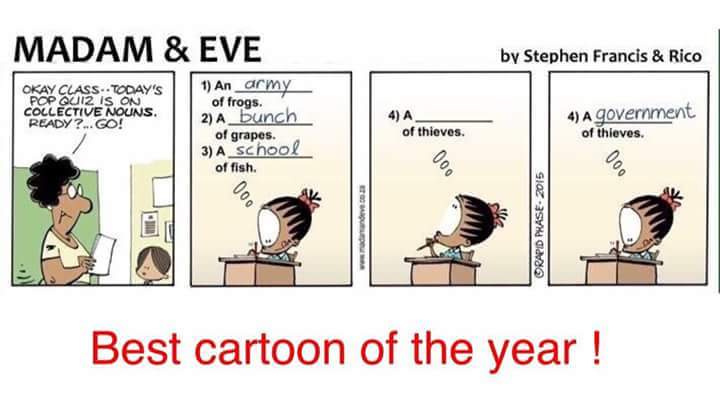I am referring to Shamsul Akmar's (editor of 'The Mole') article in New Sunday Times dated October 13:
TWIST: Economist, newspaper contradict each other over criticism of affirmative action
'It is not Bumiputeras who are depriving non-Bumiputeras of opportunities in the private sector as it is dominated and controlled by non-Bumiputeras.'
More:
http://www.nst.com.my/opinion/columnist/an-argument-in-folly-1.374590
I have followed arguments on this topic before and we can never reach an agreement, with each side refusing to accept the other's reasons.
From a non-Bumiputera's point of view, government policies favouring Bumiputeras are many, in terms of education, employment and business opportunities. Before I continue, is there an agreement on this? If not, then it is best left to the employers (other than government-controlled), be they private sectors or multi-national corporations, to select their employees. They are the ones who make such decisions, not us.
Let's just leave race out of this for a moment. Anyone who can fit these job requirements will be chosen:
*ability to speak, read and write Mandarin;
*has a driving licence;
*willing to work beyond working hours, if and when necessary;
I am Chinese, but not literate in Mandarin, I do not stand a chance at all. If it is a family business and the patriarch or matriarch can only speak his or her own dialect, then anyone who can communicate well with him or her will be preferred.
Is it true that our government schools and higher institutions of learning had been lowering entry requirements and lowering passing marks? I am assuming it is true, and I wish others to imagine the effects of these government actions over the years, to please the majority and for political expediency. For those who disagree, then I wish to refer them to the right of employers to select employees who fit their requirements. In this case, I wish to include multi-national companies who are likely to insist on proficiency in English, and in the case of companies having dealings with China, the need to be literate in Mandarin, besides being qualified for the job.
Recently, with the increasing importance of doing business in China, many Chinese-educated Malaysians were spoilt for choice (qualified in various disciplines which are in demand, like accountants). They could choose between working in China or Singapore. Similarly, for those proficient in English and if this is the main language of communication in MNCs, they were preferred over those who were not.
In other words, for those who have what it takes, they have a wider market to choose from, whether to work overseas, in Singapore, or remain in Malaysia.
Without getting worked up in arguing who is right or wrong over our well known affirmative action in favour of majority race, it is up to the individuals to decide whether to improve themselves in terms of education, language ability, knowledge of IT, and so on, to increase their chances of getting good jobs with excellent advancement opportunities.
Update Oct 24:
"The original interview was about the high level of unemployment of graduates in Malaysia. I had said that many of our graduates (not singling out any race) are not only unemployed but more seriously are “unemployable” due to the drastic decline in the quality of education received. This problem is recognized by the Prime Minister, Datuk Seri Najib Razak when he mooted setting up a Graduate Employability Taskforce with an allocation of RM200 million to make graduates more employable during the 2013 Budget presentation. He also announced an additional RM440 million for the Skills Development Fund Corporation.
Something has gone terribly wrong with our higher education system. It is well known that the standard of our education has declined drastically the last 40 years. After spending billions of ringgit to train our graduates, they are still not up to standard for employment. The government has to spend another RM640 million ringgit to make them more employable.
Even the Ministry of Higher Education (MOHE) and the Ministry of Manpower have highlighted this problem. According to the MOHE, a total of 184,581 students graduated in 2011, and 44,391 or 24 per cent, mostly bachelor’s degree holders, are unemployed. Arts and Social Sciences graduates form the highest number of unemployed, constituting 45 per cent.
In the medical field, about 8,000 nursing graduates have not secured jobs. According to Minister Datuk Seri Dr S Subramaniam, this phenomenon is because of “the low quality of nurses, including poor language proficiency and nursing skills and training. Because of this most of them have been unemployed two years after graduation.” (NST, 8 October 2012).
In November 2011, a Jobstreet poll of human resource managers in the country found that more than 50 per cent of respondents said they were unable to hire the graduates due to “poor communication skills, notably lack of command of the English language”.
In short this problem is not a racial problem but a socio-economic malaise that must be rationally examined without racial mongering. But unfortunately it has been spun into a racial issue."
More:
Mah Hui responds to Mahathir and Shamsul
http://anilnetto.com/society/media/lim-mah-hui-responds-to-mahathir-and-akmar/
Link
TWIST: Economist, newspaper contradict each other over criticism of affirmative action
'It is not Bumiputeras who are depriving non-Bumiputeras of opportunities in the private sector as it is dominated and controlled by non-Bumiputeras.'
More:
http://www.nst.com.my/opinion/columnist/an-argument-in-folly-1.374590
I have followed arguments on this topic before and we can never reach an agreement, with each side refusing to accept the other's reasons.
From a non-Bumiputera's point of view, government policies favouring Bumiputeras are many, in terms of education, employment and business opportunities. Before I continue, is there an agreement on this? If not, then it is best left to the employers (other than government-controlled), be they private sectors or multi-national corporations, to select their employees. They are the ones who make such decisions, not us.
Let's just leave race out of this for a moment. Anyone who can fit these job requirements will be chosen:
*ability to speak, read and write Mandarin;
*has a driving licence;
*willing to work beyond working hours, if and when necessary;
I am Chinese, but not literate in Mandarin, I do not stand a chance at all. If it is a family business and the patriarch or matriarch can only speak his or her own dialect, then anyone who can communicate well with him or her will be preferred.
Is it true that our government schools and higher institutions of learning had been lowering entry requirements and lowering passing marks? I am assuming it is true, and I wish others to imagine the effects of these government actions over the years, to please the majority and for political expediency. For those who disagree, then I wish to refer them to the right of employers to select employees who fit their requirements. In this case, I wish to include multi-national companies who are likely to insist on proficiency in English, and in the case of companies having dealings with China, the need to be literate in Mandarin, besides being qualified for the job.
Recently, with the increasing importance of doing business in China, many Chinese-educated Malaysians were spoilt for choice (qualified in various disciplines which are in demand, like accountants). They could choose between working in China or Singapore. Similarly, for those proficient in English and if this is the main language of communication in MNCs, they were preferred over those who were not.
In other words, for those who have what it takes, they have a wider market to choose from, whether to work overseas, in Singapore, or remain in Malaysia.
Without getting worked up in arguing who is right or wrong over our well known affirmative action in favour of majority race, it is up to the individuals to decide whether to improve themselves in terms of education, language ability, knowledge of IT, and so on, to increase their chances of getting good jobs with excellent advancement opportunities.
Update Oct 24:
"The original interview was about the high level of unemployment of graduates in Malaysia. I had said that many of our graduates (not singling out any race) are not only unemployed but more seriously are “unemployable” due to the drastic decline in the quality of education received. This problem is recognized by the Prime Minister, Datuk Seri Najib Razak when he mooted setting up a Graduate Employability Taskforce with an allocation of RM200 million to make graduates more employable during the 2013 Budget presentation. He also announced an additional RM440 million for the Skills Development Fund Corporation.
Something has gone terribly wrong with our higher education system. It is well known that the standard of our education has declined drastically the last 40 years. After spending billions of ringgit to train our graduates, they are still not up to standard for employment. The government has to spend another RM640 million ringgit to make them more employable.
Even the Ministry of Higher Education (MOHE) and the Ministry of Manpower have highlighted this problem. According to the MOHE, a total of 184,581 students graduated in 2011, and 44,391 or 24 per cent, mostly bachelor’s degree holders, are unemployed. Arts and Social Sciences graduates form the highest number of unemployed, constituting 45 per cent.
In the medical field, about 8,000 nursing graduates have not secured jobs. According to Minister Datuk Seri Dr S Subramaniam, this phenomenon is because of “the low quality of nurses, including poor language proficiency and nursing skills and training. Because of this most of them have been unemployed two years after graduation.” (NST, 8 October 2012).
In November 2011, a Jobstreet poll of human resource managers in the country found that more than 50 per cent of respondents said they were unable to hire the graduates due to “poor communication skills, notably lack of command of the English language”.
In short this problem is not a racial problem but a socio-economic malaise that must be rationally examined without racial mongering. But unfortunately it has been spun into a racial issue."
More:
Mah Hui responds to Mahathir and Shamsul
http://anilnetto.com/society/media/lim-mah-hui-responds-to-mahathir-and-akmar/





No comments:
Post a Comment